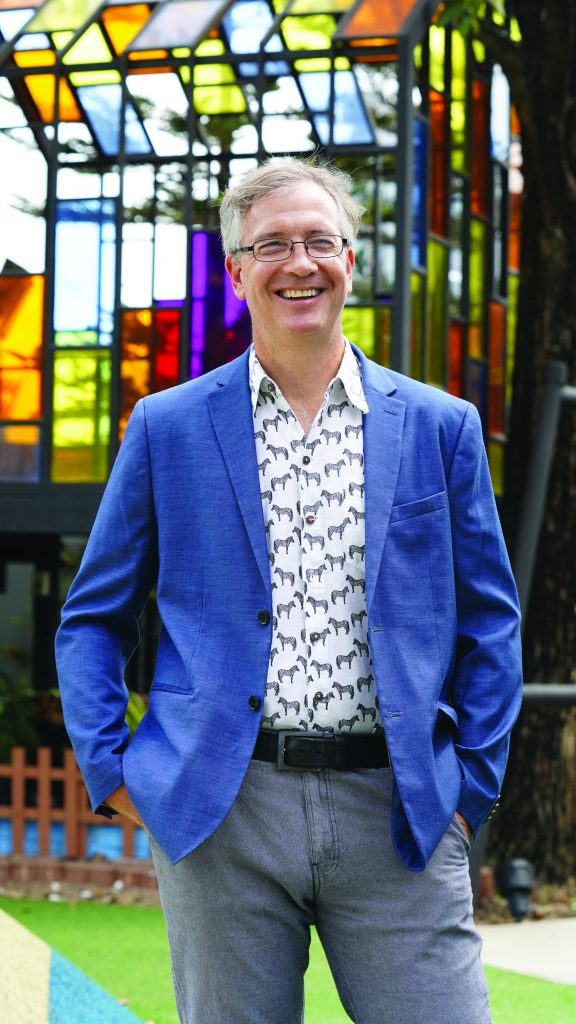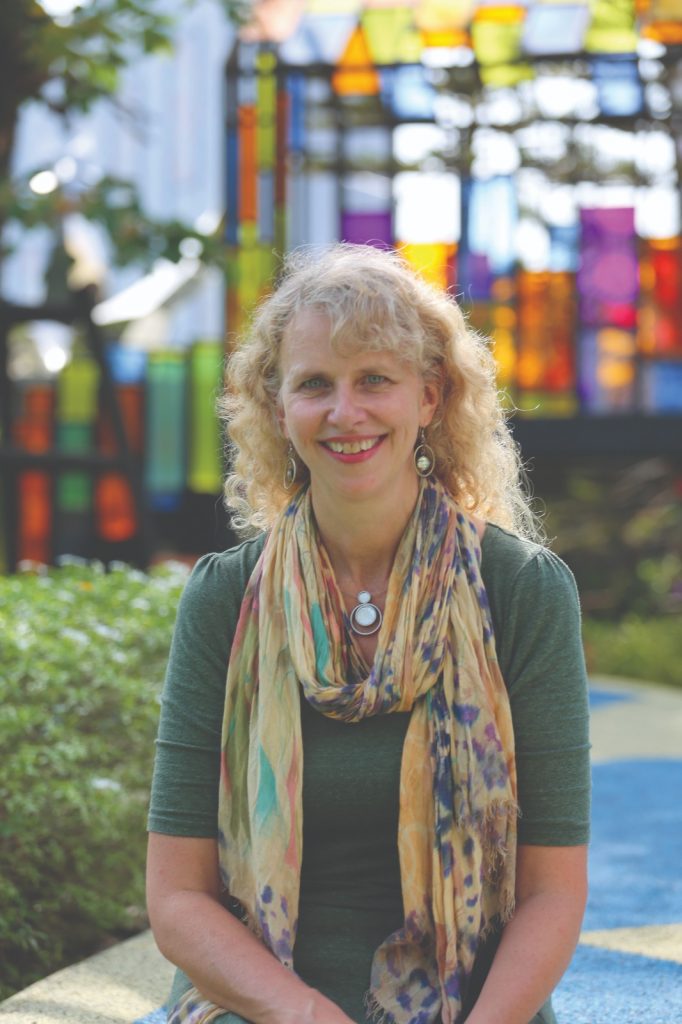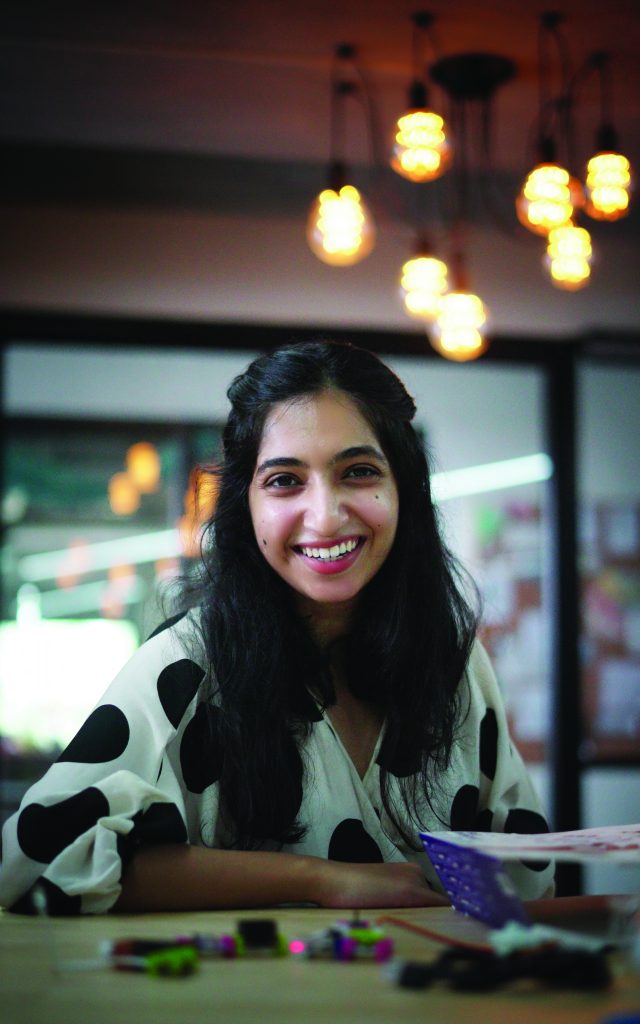How Didyasarin International Preparatory School Bangkok fully engages children while maintaining rigorous academic standards.
With the ever-evolving face of education, emerging trends, and research, finding the right approach to educating your child is paramount. D-PREP International School entered Thailand’s educational scene with one goal in mind: preparing students for the future through experiential and project-based learning, fostering the real-world skills they need to thrive in the future. A sister school of The American School of Bangkok, D-PREP is managed by the same key leadership team, with Mrs. Lakhana Didyasarin as Chairperson and Ms. Lady Didyasarin Tavedikul serving as the School Director for both D-PREP and ASB (Sukhumvit). Thus, D-PREP was born from four generations of educators, with almost 40 years of international school experience in Thailand.
Masala met with two of D-PREP’s leadership team, dynamic husband-and-wife duo Amy Marx, the school’s Principal; and Christopher Koerber, the Director of Teaching, Learning & Curriculum; as well as the school’s Design Thinking Consultant, Noora Noushad; to understand how D-PREP nurtures their students’ heart, mind, body, and soul to help them achieve their full potential in the 21st Century.
Both with undergraduate backgrounds in prestigious Ivy League universities, Amy in Yale University and Christopher in Brown University, the duo also finished their Master’s degrees in Boston University and Lesley University, respectively. Their rigorous academic background, a testament to hard work and perseverance, helped shape their desire to aid students achieve similar educational fulfillment. “It informed our careers because we believe that any student regardless of where they are starting from can achieve getting into a top-tier school,” Chris explains.
Bringing to bear over two decades of experience in education, educational policy and research, and school leadership, both Amy and Chris started their careers in the U.S. before moving to India, seeking a more global perspective for their three children. In India they embarked on the challenge of bringing the Expeditionary Learning (EL) model, which focuses on experiential learning, to an Asian context. Now in Thailand, they are once more at the vanguard of bringing EL education to a new country, incorporating their experiences in India and the U.S. to inform D-PREP’s learning environment.
Your previous school was the number one CBSE co-ed day school in all of India, according to the Education World India School Rankings 2020-2021. What did you learn or observe at this school regarding the Indian educational system that you are now bringing to Thailand?
Amy: Our top ranked school in India had done substantial work on experiential learning, in contrast to many schools there that only focused on rote learning. Here in Thailand, there are also schools that are traditional in the way they function – more about rote learning and memorisation. D-PREP is not that. We believe if we nurture students to be passionate and curious, then we can create learners who are skilled in collaboration, critical thinking, and creative problem solving, which are important in the work world. We also learned in India the importance of socio-emotional learning. At D-PREP, we use an expanded view of what student achievement looks like, including a focus on how children feel about coming to the school or their individual progress.
Chris: Our experience in India provides important proof of concept that the educational reform we are pushing, experiential, project-based learning, has been successful in an Asian context. With a more expanded view of what a rigorous school is, that includes character and student created high quality work, along with mastery of skills and content, we were still able to achieve some of the highest rankings in exam scores and were ranked as the top school.
Having worked and lived in India, you must have a good idea about what Indian families are looking for in a school, in general. How do you feel you address this at D-PREP international School?
Amy: Our experience of Indian families is that they’re looking for a school that is rigorous and has high academic standards, and our D-PREP standards align to the best standards around the world, ensuring that our students are competitive anywhere in the world.
For example, in the primary years, we use the International Baccalaureate Primary Years Programme (PYP) that ensures that the kids have agency in their projects and learning environment. We also have influence from Reggio Emilia from Italy, from Finland on how to keep kids active, some U.S. influence in terms of literacy practices and standards, from Singapore in mathematics standards, and from Ontario, Canada in science and social studies. We’ve looked around the world and created the best curriculum for our children. We also have a trilingual program, which I know a lot of Indian families will be interested in – our students learn Thai and Chinese on top of English. In addition to that, we have extensive extra-curricular programmes, encompassing sports, arts, academic debate, and even Muay Thai and cooking, among many others. Our campus is uniquely suited to accommodate the variety of experiences we offer our students.
Chris: India is very competitive, and that sense of competition runs deep. What I’ve learned in India is that when done well, holistic development can actually expand the educational rigour. Rather than focus on exam pressure, we go further by developing traits such as student perseverance, collaboration, creativity, and motivation.
The capacities and character traits of the student developed this way makes them more competitive in the future for college and their chosen careers.
Masala also approached Noora Noushad, who is currently pursuing her PhD in Learning Sciences and Technology from the University of Pennsylvania, the Ivy institute ranked 2nd among the Graduate Schools of Education worldwide. She walked us through how digital literacy and technology plays an important part in D-PREP’s curriculum, giving students critical skills for the future.
Tell us about the work you are doing at UPenn and how you are bringing cutting-edge research to D-PREP.
My doctoral research is largely inspired by the work I pioneered in the United States – where I curated a digital literacy curriculum that empowered children. Students learned how to program mobile applications and designed apps to reduce their carbon footprint in their community, which enabled them to see the impact they could make in the real world as children. This idea of digital literacy was further adopted by schools in India. The success we had with this framework of digital literacy was recognised by Google India, ISTE in the States and BETT in London. At D-PREP the intent is to create a progressional curriculum from Nursery to Middle school which empowers our students to shift their interactions with technology from passive consumers to active creators and designers of technology. In D-PREP we see a very fertile ground in terms of the transdisciplinary focus that already exists, so subjects are not taught in isolation, but in an integrated manner.
We see an increased role of technology in our children’s lives, how do we as schools/parents navigate the grey areas of technology?
I would push for the thinking to move beyond just screen time. The critical question one should ask is, what is the nature of interaction with technology? The only way to have a litmus test of, “is their interaction good or bad?” is looking closer at the interaction and asking, are they interacting with technology as purely consumers, i.e., are they watching videos on YouTube or watching feeds on Instagram or are they interacting with technology as creators, that is are they making mobile apps or creating content of value? With the latter, they are no longer passive consumers, but they are active agents of creation and active agents of change! That is what we encourage here.
How do we see the educational landscape evolving to meet the ever-growing demands of future careers?
There is a shift both in the research world and in practice, where before we focused on test scores, which reinforces the belief of uniformity, but now we encourage individual thinking and originality. According to the World Economic Forum, around 60 percent of children entering pre-primary today will not graduate with the skills that they need to thrive in future work. I feel that D-PREP is taking that future-forward approach by ensuring that students have a foundation as digital creators and design makers cutting edge research to D-PREP.










